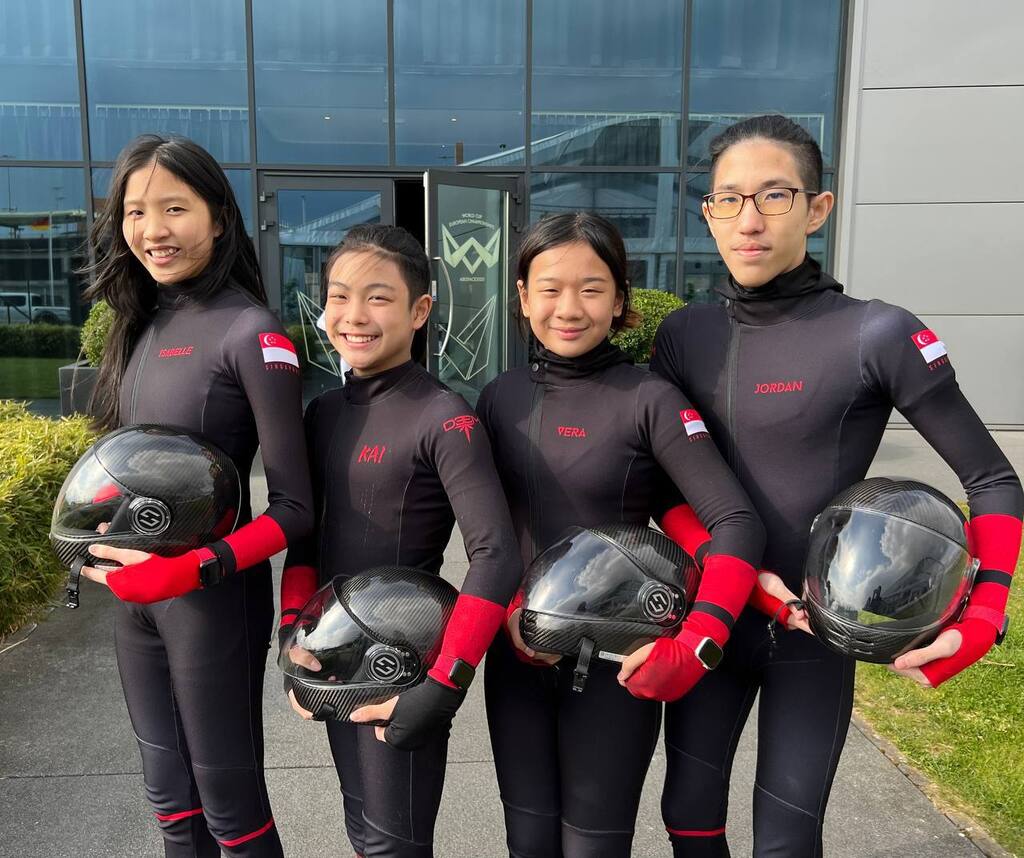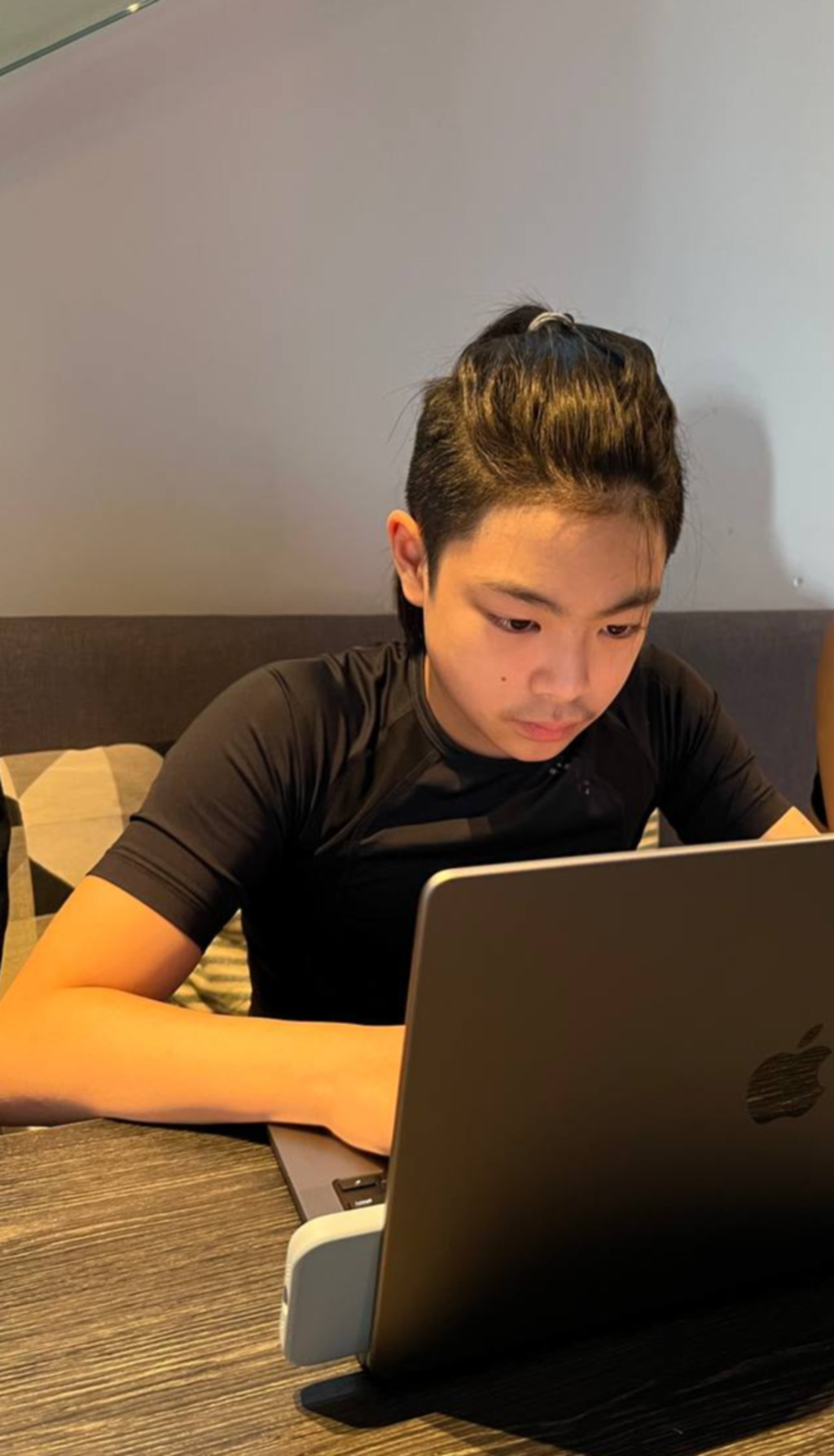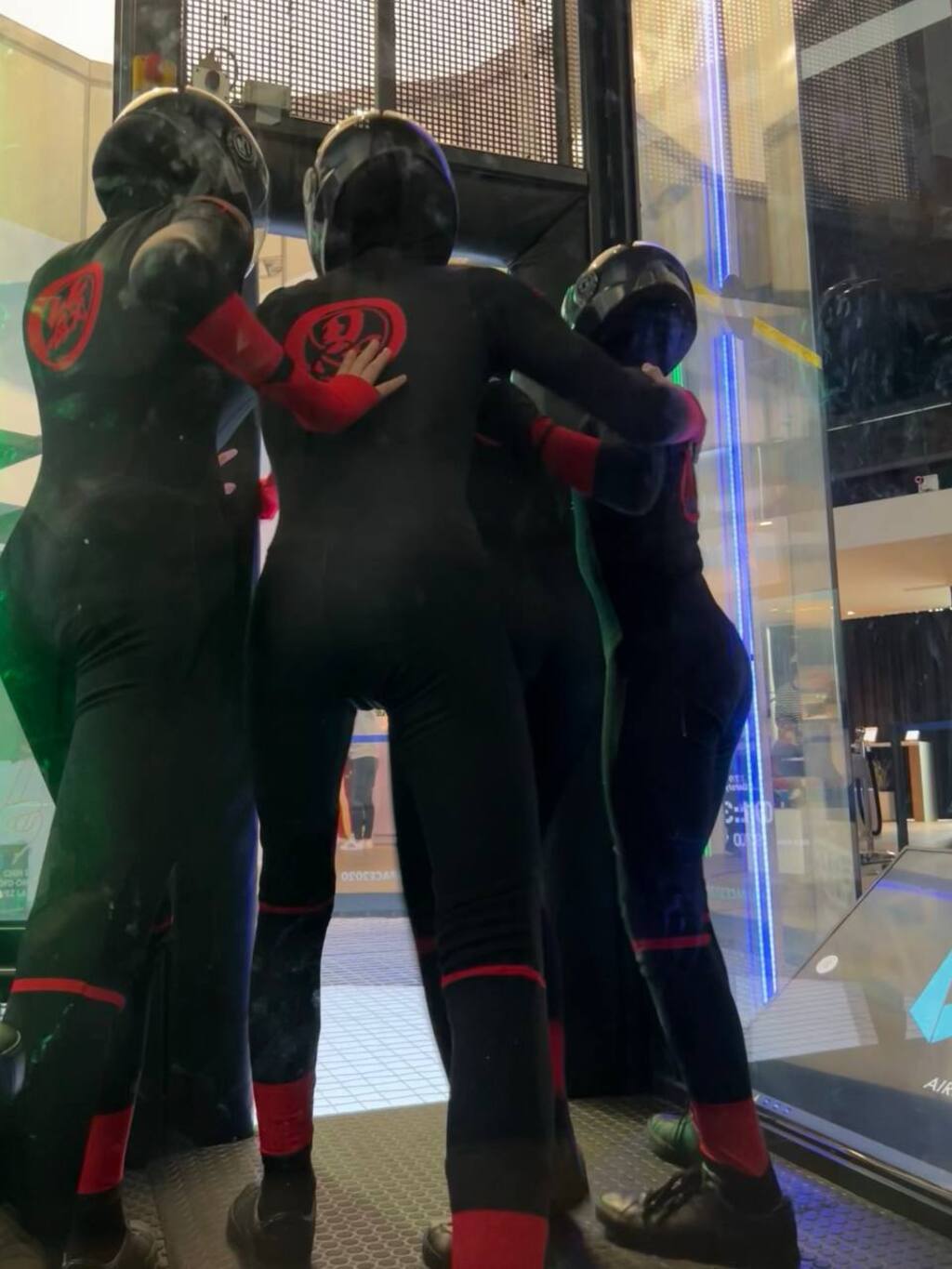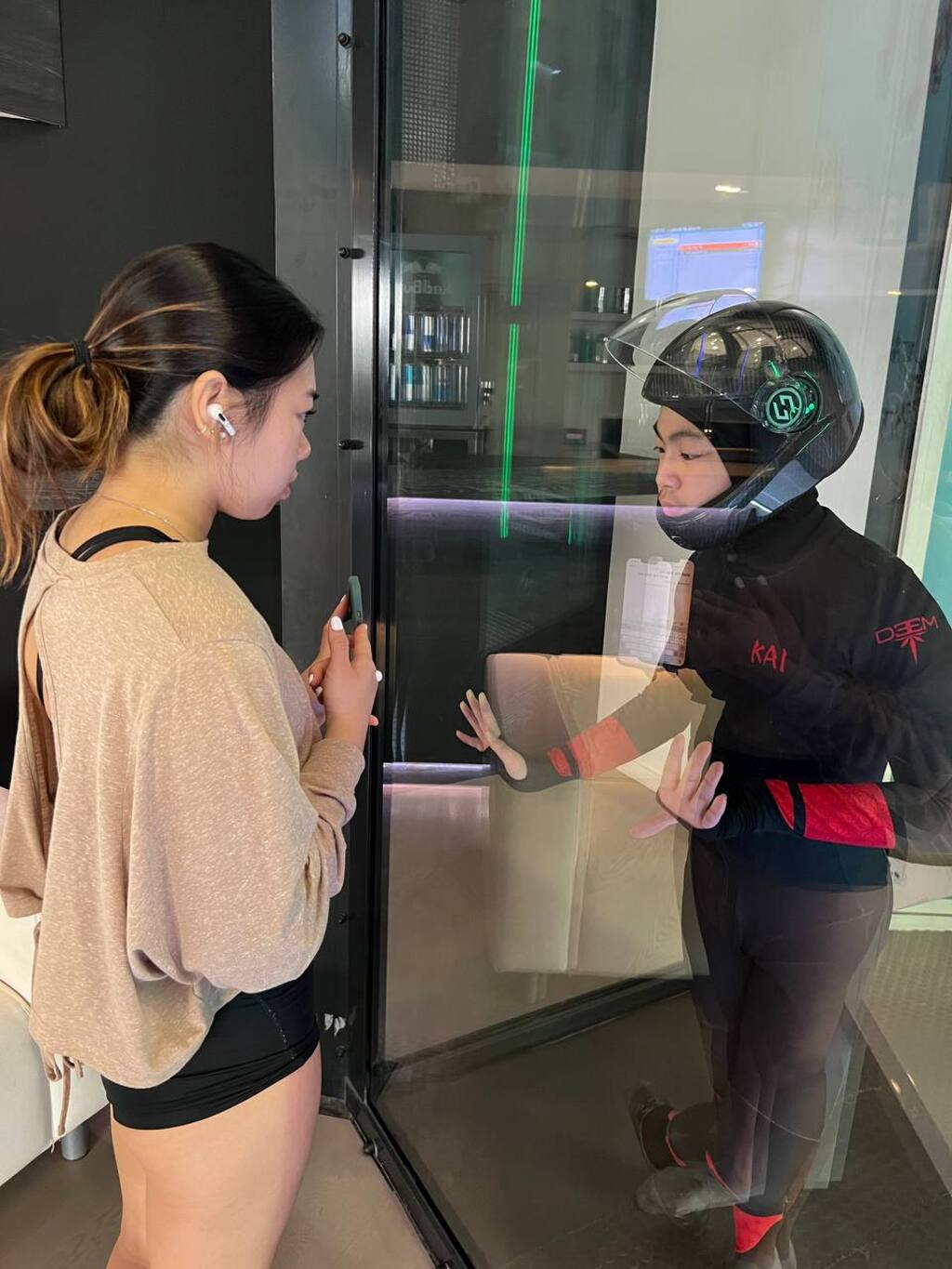How Singapore’s indoor skydivers planked, flipped and studied their way to gold
These 4 young athletes, aged 13 to 18, share how they balanced homework, and the hard work of training, to eventually win gold medals.
- 5 Jan 2023

Left to right: Isabelle, Kai, Vera & Jordan. Photo credit: Kai.
“Every time we plank, we put Taylor Swift on Spotify.” Vera laughs. “It makes the planking easier.”
7-minute planks are commonplace for this young team of indoor skydivers, comprising 13-year-old Kai Minejima-Lee, 13-year-old Vera Poh, 15-year-old Isabelle Koh, and 18-year-old Jordan Lee.
7-minute planks are commonplace for this young team of indoor skydivers, comprising 13-year-old Kai Minejima-Lee, 13-year-old Vera Poh, 15-year-old Isabelle Koh, and 18-year-old Jordan Lee.
Why planks?
“For the flips we do, we really need the core strength and balance.” Kai explains. Despite only being 13, Kai is a seasoned indoor skydiver, having trained for more than 6 years.
“For the flips we do, we really need the core strength and balance.” Kai explains. Despite only being 13, Kai is a seasoned indoor skydiver, having trained for more than 6 years.
He started when he was 7, the minimum age to enter the wind tunnel. Last year, he swept the 3 titles he participated in at the FAI World Cup of Indoor Skydiving 2022, held in Charleroi, Belgium from April 2022.

Kai and Kyra utilising their available time to catch up on their studies. Photo credit: Naomi Minejima.
But for the rest of his teammates, it was made tougher with school.
“It got to a point where I had to take my homework to training, so that I could use the waiting time to finish my homework.” Isabelle winces as she recounts the challenge of balancing schoolwork with training. In their off-season, they train twice a week.
Trainings sometime take place after a long day at school, as the wind tunnel can often be crowded during the weekends. As the public can access the wind tunnel, this means that they have to make use of what little time they have there.
Jordan had to balance between his national exams and his training.
“I had to ask my teachers for what they were going to teach a semester before so that I could have time to get up to speed, whilst being away on competition.”
Vera suddenly interjects. “Oh, I didn’t know you could do that! I should have asked my teachers for that!”
“We are like family here. I first met these people when I was 7, and everyone here has become my friend!” Kai exclaims.
“It got to a point where I had to take my homework to training, so that I could use the waiting time to finish my homework.” Isabelle winces as she recounts the challenge of balancing schoolwork with training. In their off-season, they train twice a week.
Trainings sometime take place after a long day at school, as the wind tunnel can often be crowded during the weekends. As the public can access the wind tunnel, this means that they have to make use of what little time they have there.
Jordan had to balance between his national exams and his training.
“I had to ask my teachers for what they were going to teach a semester before so that I could have time to get up to speed, whilst being away on competition.”
Vera suddenly interjects. “Oh, I didn’t know you could do that! I should have asked my teachers for that!”
Success as a community
The team laughs. It’s clear that camaraderie has played a big part in their success.“We are like family here. I first met these people when I was 7, and everyone here has become my friend!” Kai exclaims.

The team preparing to enter the tunnel. Photo credit: Kai.
The long friendships in the team almost seem like an act of serendipity.
Vera was first exposed to indoor skydiving by Kyra, her older sister, who also won her first gold medal in the Solo Freestyle Open Category at the Australian Indoor Skydiving Championship in 2016.
To date, Kyra has won a total of 35 Golds, 11 Silvers, and 7 Bronzes.
As Vera saw Kyra spinning, backflipping, and doing stunts, she thought, “One day I want to be like that.”
But they were only introduced to indoor skydiving because their mother was doing marketing for the wind tunnel.
As Vera started, she met more people like Kai, Isabelle, and Jordan. Needing to team up for group events, they eventually started training together.
Despite the team’s achievements, they credit the wider community for their success.For example, during their competition, despite the 7-hour time zone difference and needing to wake up at 1am, their supporters still tuned into the livestream to lend them their cheers.
“Our parents have really supported us through this journey. Sending us for training, getting us food, small things like that, have been really important.” Isabelle adds.
Vera’s sister, Kyra, also serves as an inspiring force for the team. Kyra coaches the team in their routines and is always a quick message away to help with any problems the team faces.
The team is fortunate to have more than one World-Class coach guiding them. Choo Yi Xuan - who is part of the Dynamic 2-way team, Firefly, and has won the 2 Way Dynamic World Cup Title in 2018, has played an instrumental role as the team’s coach during the FAI World Cup of Indoor Skydiving 2022. It was through her guidance that the team was able to take the top position in all categories they competed in.
Vera was first exposed to indoor skydiving by Kyra, her older sister, who also won her first gold medal in the Solo Freestyle Open Category at the Australian Indoor Skydiving Championship in 2016.
To date, Kyra has won a total of 35 Golds, 11 Silvers, and 7 Bronzes.
As Vera saw Kyra spinning, backflipping, and doing stunts, she thought, “One day I want to be like that.”
But they were only introduced to indoor skydiving because their mother was doing marketing for the wind tunnel.
As Vera started, she met more people like Kai, Isabelle, and Jordan. Needing to team up for group events, they eventually started training together.
Despite the team’s achievements, they credit the wider community for their success.For example, during their competition, despite the 7-hour time zone difference and needing to wake up at 1am, their supporters still tuned into the livestream to lend them their cheers.
“Our parents have really supported us through this journey. Sending us for training, getting us food, small things like that, have been really important.” Isabelle adds.
Vera’s sister, Kyra, also serves as an inspiring force for the team. Kyra coaches the team in their routines and is always a quick message away to help with any problems the team faces.
The team is fortunate to have more than one World-Class coach guiding them. Choo Yi Xuan - who is part of the Dynamic 2-way team, Firefly, and has won the 2 Way Dynamic World Cup Title in 2018, has played an instrumental role as the team’s coach during the FAI World Cup of Indoor Skydiving 2022. It was through her guidance that the team was able to take the top position in all categories they competed in.

Kyra showing Kai a recording of his routine during training. Photo credit: Naomi Minejima.
Coaching is an essential part of excelling at a technically complex sport like indoor skydiving, with the specific, one-to-one, guidance from coaches vital to improve one’s technique.
For the Freestyle categories, flyers perform their own artistic routines based on a music track of their choosing. The judges will then determine the winner based on Technical Difficulty, Execution, Variety, Flow, and Entertainment
This freestyle routine can range between 60 to 90 seconds.
For the ‘Speed’ routines, flyers in groups of 2 or 4 (depending on whether it’s 2-Way or 4-Way) are asked to perform a routine of three randomly drawn Compulsory Patterns (one from each group, Snakes, Verticals and Mixers, in that order), repeated three times, in the fastest time possible.
This means that when the time starts, the flyers must coordinate quickly to form patterns.
Remember the scene in Iron Man where Iron Man had to quickly link passengers falling from the airplane, joining their hands together? Imagine that now, except that it’s in different patterns, faster.
Much, much faster.
What is indoor skydiving?
Essentially, there are two categories to compete in – Freestyle, and Speed.For the Freestyle categories, flyers perform their own artistic routines based on a music track of their choosing. The judges will then determine the winner based on Technical Difficulty, Execution, Variety, Flow, and Entertainment
This freestyle routine can range between 60 to 90 seconds.
For the ‘Speed’ routines, flyers in groups of 2 or 4 (depending on whether it’s 2-Way or 4-Way) are asked to perform a routine of three randomly drawn Compulsory Patterns (one from each group, Snakes, Verticals and Mixers, in that order), repeated three times, in the fastest time possible.
This means that when the time starts, the flyers must coordinate quickly to form patterns.
Remember the scene in Iron Man where Iron Man had to quickly link passengers falling from the airplane, joining their hands together? Imagine that now, except that it’s in different patterns, faster.
Much, much faster.
With both feet planted on the ground
Winning has been a surreal experience for all of them. For Kai, he says that “the first time I heard the national anthem play as I stood at the podium really struck home for me. I felt a deep sense of national pride.”Despite their recent win, the team still has their feet planted firmly on the ground. They know the hard work has only just begun.
Despite having won the World Championships in April 2022, they haven’t rested on their laurels. In September, at the Australian Open Indoor Skydiving Championships, they won 5 Golds and 3 Silver medals.
Next in sight? The Czech Open 2023, from 13th to 14th January.
They hope that indoor skydiving can one day become an Olympic sport, so that they can play on the world’s biggest sporting stage.
Their advice for other young Singaporeans aspiring to sporting excellence?
Isabelle gently adds, “As cliche as this sounds, work hard. There’s really no substitute for hard work. Don’t give up. It may not get easier, but you will get better.”






